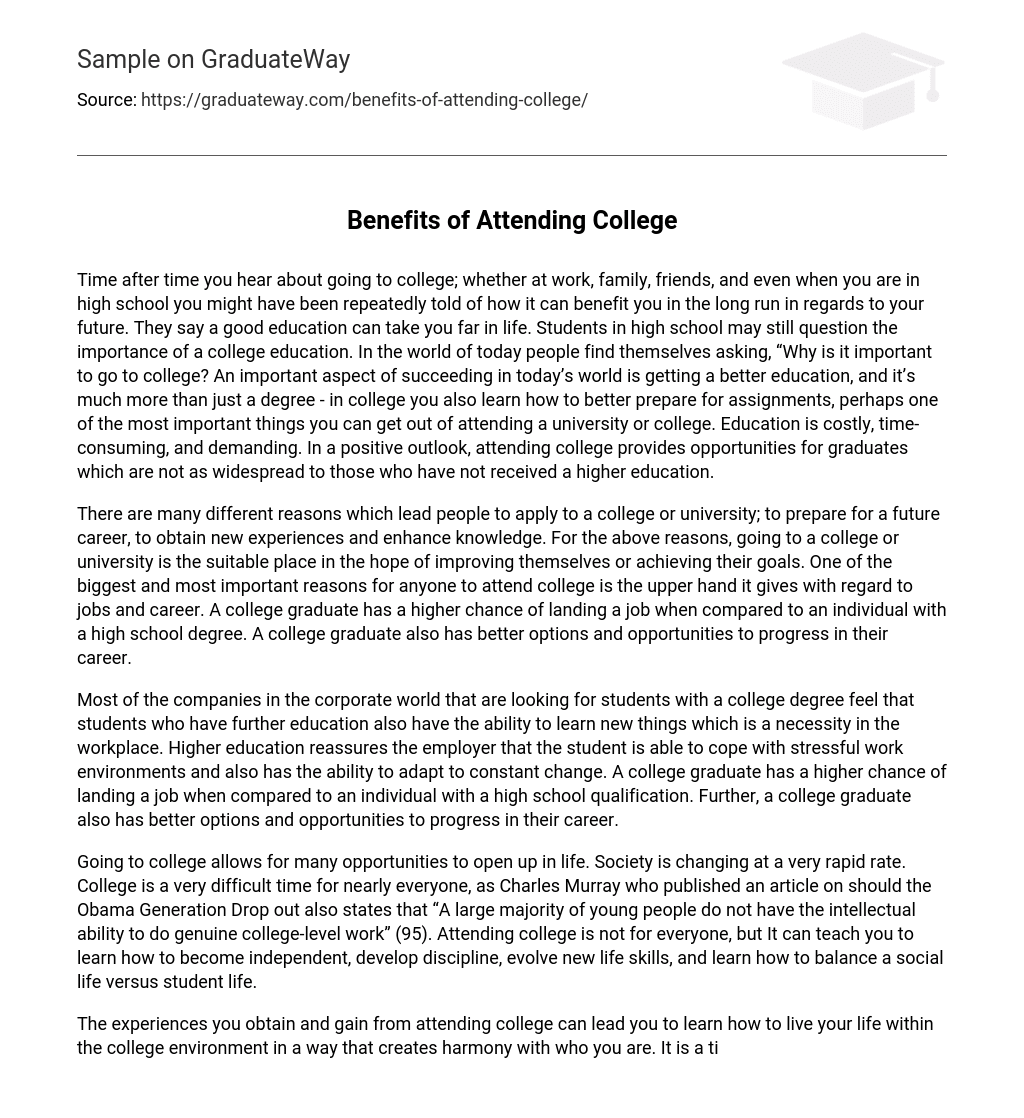The importance of attending college is often emphasized by colleagues, family members, friends, and even during high school. The significance of a college education in shaping one’s future success is widely acknowledged. Despite this awareness, high school students may still question the necessity of a college education. Nowadays, many individuals ponder upon the essentiality of going to college. The answer lies in the fact that acquiring higher education is crucial for thriving in today’s society. It goes beyond merely obtaining a degree; college also imparts valuable skills for better assignment preparation—a significant advantage of attending a university or college. Undoubtedly, education can be expensive, time-consuming, and demanding. However, looking at it optimistically, attending college opens up opportunities not as readily available to those without higher education.
There are multiple reasons why individuals apply to colleges or universities, including preparing for future careers, gaining new experiences, and increasing knowledge. This presents a great chance for self-improvement and achieving goals. Attending college also provides advantages in terms of job opportunities and career prospects. Compared to high school graduates, college graduates have higher chances of employment and more possibilities for advancing their careers.
Employers in the corporate world often prioritize hiring college graduates because they believe these individuals possess the ability to acquire new knowledge, which is crucial in any workplace. Higher education assures employers that students can handle high-pressure work environments and adapt to constant change. Compared to those with only a high school diploma, individuals with a college degree have greater chances of securing employment. Additionally, college graduates enjoy improved career prospects and increased opportunities for advancement.
In his article on the potential dropout of the Obama Generation, Charles Murray argues that college can be challenging for many individuals due to their lack of intellectual ability to handle college-level coursework (Murray 95). However, despite not being suitable for everyone, higher education provides opportunities for personal development in a rapidly changing society. It equips individuals with essential skills such as self-reliance, discipline, social aptitude, and the ability to balance social and academic responsibilities.
The experiences acquired during college enable individuals to thrive within the collegiate atmosphere while maintaining their authentic selves. This timeframe acts as an experimental phase until one determines the most effective approaches. Ultimately, harmony is attained by choosing a major that aligns with personal attributes. Once this objective is fulfilled, a tailored studying and learning system can be established to cater to one’s individual thought process.
When major changes occur, such as starting college, it is normal for life to become unbalanced. However, over time, life should become less stressful. During your college journey, you will establish many enduring friendships that can have personal and professional advantages. College education is believed to improve social networking abilities. In general, college offers an opportunity for both diligent effort and enjoyment.
Our college days are a cherished part of our memories, filled with happiness and the companionship of beloved friends. It is during this time that we often establish some of our closest bonds. College not only offers opportunities for enhancing communication skills and engaging in extracurricular activities but also facilitates the development of connections that can have a profound impact on shaping our future careers. Consequently, we form a diverse network of friends and acquaintances who can offer valuable support as we transition into the professional world and embark on our job search. Moreover, pursuing further education enables us to satisfy our thirst for knowledge and delve into subjects that truly captivate us.
Additionally, college provides a sense of comfort and prepares individuals for future situations, allowing them to navigate the challenges of everyday life with confidence. Furthermore, college offers opportunities for young adults to explore their interests by studying various subjects. This exploration can lead to the identification of a career path and access to internships and other valuable resources, giving college students an advantage over those without a degree. According to Charles Murray, “The Core disciplines taught at a true college level are tough, requiring high levels of linguistic and logical-mathematical ability” (96).
While adults typically cease acquiring new vocabulary after completing their education, possessing a larger speaking vocabulary remains beneficial as it improves reading comprehension and effective communication. Additionally, vocabulary plays a pivotal role in evaluating job prospects and forming opinions about others during daily interactions. Attending college is a significant accomplishment that signifies not only obtaining a degree but also personal development resulting in success and contentment.
Going to college is a worthwhile investment that can assist individuals in achieving their desired career aspirations and enhancing their overall lives. In the United States, our country’s prosperity depends on students seeking higher education to gain the essential skills needed for today’s competitive job market. Acquiring a degree enables individuals to access improved job prospects and earn higher incomes, eliminating the necessity of accepting low-paying positions and ensuring a more prosperous future. Nonetheless, college offers more than solely obtaining a degree; it also imparts crucial life skills that contribute to personal growth.
Work Cited
According to Murray (2013), in “Should the Obama Generation Drop Out?”, a chapter in The Blair Reader: Exploring Issues and Ideas edited by Kirszner and Mandell, it is questioned whether the younger generation during the Obama presidency should disengage from societal involvement.





